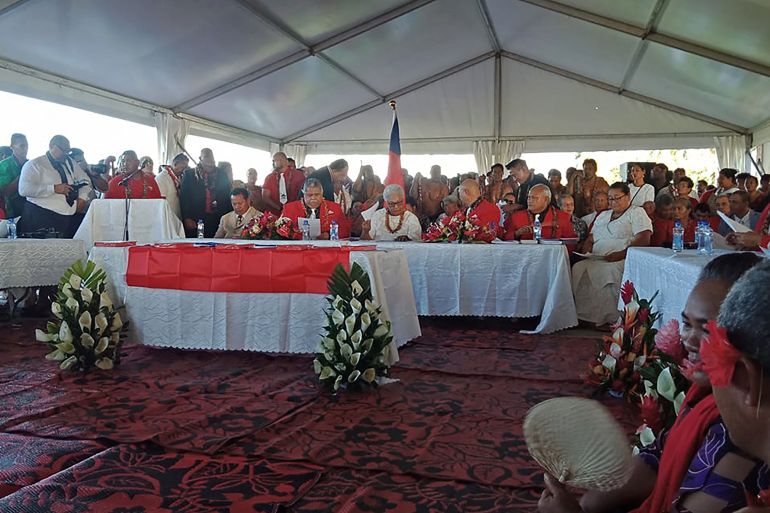UN offers help as Samoa rivals both claim leadership
UN calls for dialogue after incumbent leader refuses to cede power despite election loss.

The United Nations has urged political leaders in Samoa to resolve a political crisis through dialogue after contested election results left the South Pacific nation with two leaders claiming a mandate to run the country.
Tuesday’s appeal came a day after police locked Prime Minister-elect Fiame Naomi Mata’afa out of the parliament as she arrived with members of her FAST party to form a new government and take her oath as Samoa’s first female leader.
Keep reading
list of 4 itemsSamoa plunges into crisis as head of state suspends parliament
Samoa set to appoint first female prime minister
Counting under way in tight Samoa election
While a series of court rulings back Mata’afa’s leadership, incumbent Prime Minister Tuilaepa Sailele Malielegaoi, who has governed Samoa for 22 years, has refused to relinquish power.
Malielegaoi retains the support of Samoa’s head of state, who has suspended parliamentary hearings, frustrating plans to confirm the new government.
A UN spokesman said on Tuesday that Secretary-General Antonio Guterres was following developments closely and “stands ready to provide support to Samoa if requested by the parties”.
Guterres also “urges the leaders in Samoa to find solutions to the current political situation through dialogue in the best interest of the people and institutions of Samoa”, the spokesman added.
An island nation of 220,000 people, Samoa was plunged into crisis when an April 9 election resulted in a tie between Mata’afa’s FAST Party and Malielegaoi’s Human Rights Protection Party (HRPP), with one independent candidate.
Electoral authorities intervened, appointing another HRPP candidate, while the independent candidate chose to side with FAST, making it 26-26.
The head of state, Tuimalealiifano Vaaletoa Sualauvi II, then called for a second election for May 21.
But the Supreme Court overturned the post-election creation of an additional parliamentary seat and the call for fresh elections, restoring Mata’afa’s party to a 26-25 majority.
Sualauvi then suspended parliament, prompting Mata’afa and members of her party to hold an ad hoc swearing-in ceremony at the parliament grounds on Monday.
Malielegaoi labelled the ceremony “treason”, saying “there is only one government in Samoa, even if we are just the custodian government.”
Mata’afa, who has accused her rival of illegally taking over the government, revealed on Tuesday that she was facing prosecution over the makeshift ceremony.
“It’s all part of the electoral game I suppose… I don’t think we were terribly surprised,” the 64-year-old told New Zealand broadcaster TVNZ.
The political crisis in Samoa has drawn in the wider South Pacific community, with the Federated States of Micronesia (FSM) the first nation to recognise the Mata’afa-led government.
“As the FSM is itself a democracy that both upholds and promotes democratic values, it is imperative that we show our friends – especially during their darkest hours – that we stand with them,” President David Panuelo said in a statement.
“Samoa is a cherished friend and Pacific neighbour; recent weeks have been very troubling for the Samoan people,” he added. “They must know that they are not facing these challenges alone.”
Australia and New Zealand have not formally recognised the new government, although both have said democratic processes and the judiciary should be respected.
The Pacific Conference of Churches meanwhile has appealed to the political leaders to act justly and consider the wishes of the people above all else.